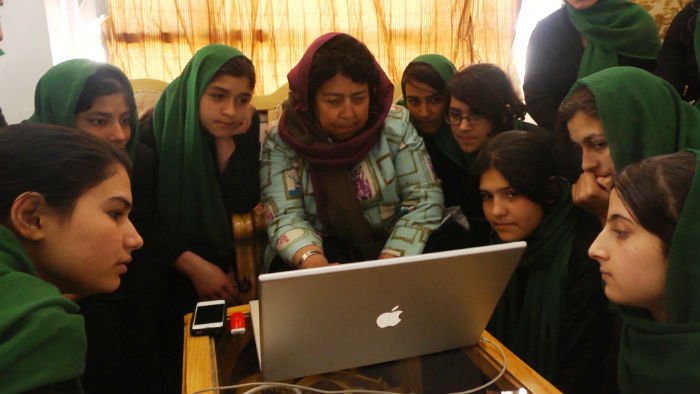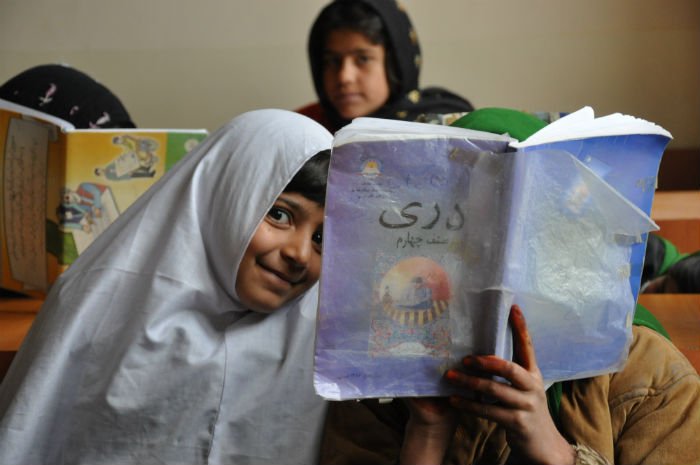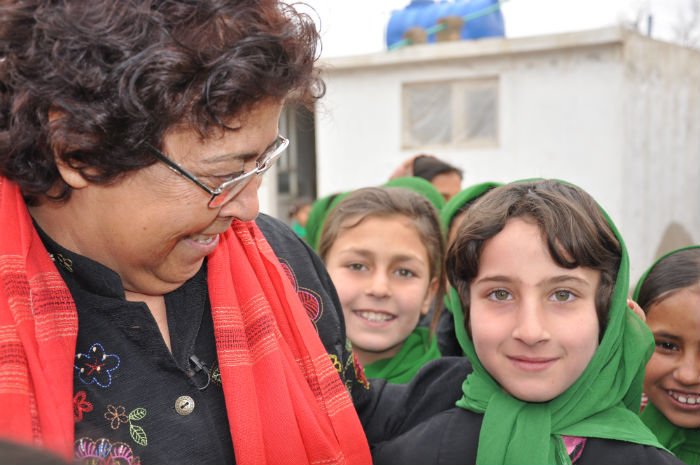Razia's Story from Principle Pictures on Vimeo.
This article was contributed by Beth Murphy, the Director of Films at The GroundTruth Project and founder of Principle Pictures. Her film “What Tomorrow Brings”, a recipient of the Gucci Tribeca Documentary Fund, featuring Yalda and the girls’ school airs on PBS’s POV series October 31st.
KABUL, Afghanistan — It’s Friday, the holy day for Muslims, and Razia Jan, a 72-year-old grandmother, has created her own sacred ritual. She is at the stove slowly stirring an enormous vat of cream of wheat. Kabul hasn’t quite woken up yet, and Razia’s cooking soundtrack is the high-pitched chirping of Siberian Chiffchaffs playing outside in her garden.
Making the dish brings back memories from her childhood in Kandahar where she lived in a compound with extended family and could pick pomegranates off trees in the yard for a snack. Her mother wasn’t much for domestic life “Oh no!,” she laughs when I asked if she learned this recipe from her mom. Her father was a student of poetry and a leader in the community who wanted her to have the best education possible which meant sending her to a private Catholic school.
“My friends and I had so much fun,” Razia remembers. “It was such a carefree, time. The most carefree time of my life.”
Razia doesn’t need a recipe to know how much of each ingredient to add. Heaping spoonfuls of cardamom. Fistfuls of raisins. Butter (lots and lots of butter). And enough sugar to turn this bland hot cereal into halwa and make it taste like dessert. When it’s done, Razia scoops the mixture into the middle of an oblong flatbread, folds the ends over, and piles the halwa sandwiches high on several platters. Today, she has enough to feed 40 people.
Although she has never gone hungry, Razia understands what it’s like to feel like an outcast. After moving to America in the 1970s to go to college, she found herself in a difficult marriage with no support system, and it was the kindness of strangers that saw her through.
With a platter of halwa wraps on her lap, Razia sits in the passenger seat and scans Kabul’s frenzied and chaotic streets looking for those who seem most in need of a hot meal. A woman sitting motionless in the road cradling her baby catches Razia’s attention, and she asks the driver to pull over.
This scene is repeated until the three platters are empty, and Razia’s Friday ritual ends.

On Saturday, the start of the 6-day school week in Afghanistan, Razia wakes with the birds again. This time she takes the driver’s seat; she is one of the few women behind the wheel in Kabul. Soon, she is out of the city, bumping down a narrow dirt road and squeezing past donkey carts and ice cream vendors. She stops in front of large mustard yellow gates and beeps for the guard to open them.
This is the Zabuli Education Center, the girls’ school Razia founded on the outskirts of Kabul Province. Before her school opened in 2008, girls here had never been allowed to go to school. And even though she was able to convince skeptical village elders to let her build the school, nine years later she is still trying to win them over.
“I tell my teachers on the first day of school to teach the kindergartners how to write their name and their father’s name,” she says. “Many of these men use their thumbprint for a signature, so if they see their daughters writing their name, it might help change the men’s attitude toward us.”
Born and raised in southern Afghanistan, Razia had come to America to visit her brother who was studying in Boston and to pursue her own college education. She planned to return home, but political unrest, civil war, war with Russia, and the Taliban takeover kept her in the U.S. where she opened a tailoring business and raised her son. It was only after the fall of the Taliban in 2001 that Razia decided to return.
What she found was a country she could no longer recognize. And fifteen years later, Afghanistan is still one of the worst places in the world to be female.
“That was so hard for me to see when I went back after spending 38 years — really all of my adult life — in the United States,” Razia says.

The attacks on September 11, 2001 changed Razia’s perspective on the two countries she called home and her role in each. She could not find enough ways to express her grief over the tragedy, her compassion for victims, and her distress at seeing Islam — the religion she had peacefully practiced all her life — being manipulated for evil purposes. When explaining why she eventually decided to return to Afghanistan to help the nation’s daughters, Razia credits the heroes in New York, who ran towards unknown danger to protect the innocent.
The Zabuli Education Center started as a K-4 school with 109 girls in 2008 and is now a bursting K-12 with almost 600 students. Last year, as the first senior class was about to graduate, Razia broke ground on a college. The Razia Jan Institute is right next door and will open in March 2017 with a curriculum that focuses on nursing, midwifery, and computer science.
Razia’s own experiences as a child helped her believe change was possible, and now in this village that change is happening.
“It wasn’t just that my father wanted me to have an education,” Razia says. “I also knew how much his education meant to him.”
When her father was jailed as a political prisoner, he turned to the poetry he had memorized for comfort. “I wish I could show you when you are lonely or in the darkness, the astonishing light of your own being,” the Sufi master Hafez had written. Soon, Razia’s father shared his knowledge with other prisoners, and they were comforted, too. If it’s true that the purpose of education is to turn mirrors into windows, then even from a dark prison cell, her father could look out and see the world.
“I think it saved his life,” Razia says.
It’s a lesson she shares today with her students. “I tell them, ‘No matter how little you know, no one can ever take that away from you.”

Images courtesy of Beth Murphy under copyright.